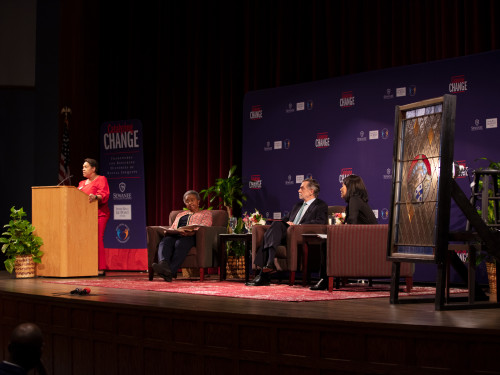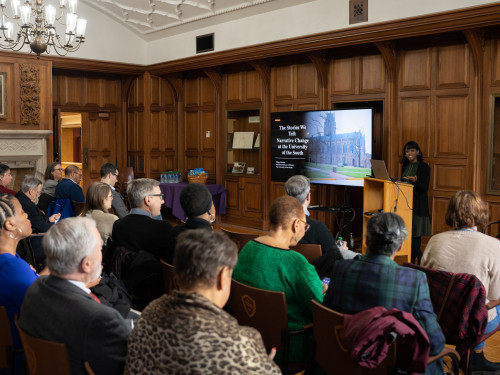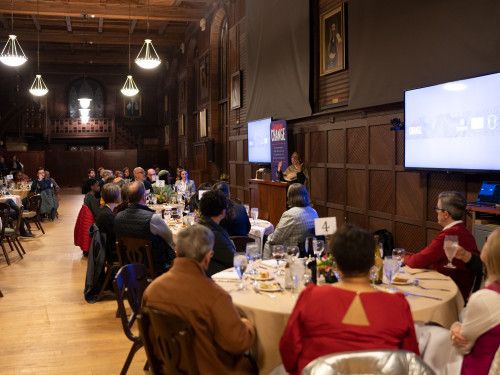Sewanee, Jessie Ball duPont Fund Build on Racial Healing Progress, Cultivate a Community of Belonging for Students, Faculty.
 Universities and philanthropic organizations across the country are facing significant challenges, not least of which is the polarized climate that impedes higher education’s historic role as a marketplace for ideas. On Jan. 9, the University of the South—embracing its role as a steward of its mission—joined with the Jessie Ball duPont Fund to convene institution leaders, scholars, educators, and activists committed to a new future for higher education.
Universities and philanthropic organizations across the country are facing significant challenges, not least of which is the polarized climate that impedes higher education’s historic role as a marketplace for ideas. On Jan. 9, the University of the South—embracing its role as a steward of its mission—joined with the Jessie Ball duPont Fund to convene institution leaders, scholars, educators, and activists committed to a new future for higher education.
The “Catalyzing Change: Frameworks for Repairing Histories of Racial Inequity” convening took place Jan. 9-11 to discuss Truth, Racial Healing, and Transformation (TRHT), an initiative implemented in partnership with the American Association of Colleges and Universities (AAC&U). TRHT is based on the belief that telling the truth about the past is critical to restoring dignity to both those who were harmed and the perpetrator of the harm. Both Sewanee and the duPont Fund have begun the journey of acknowledging the history and legacy of their respective founders, some of whom were enslavers and segregationists, respectively. Their efforts embrace the totality of their institutions’ past—not for purposes of shame but as a part of the journey that shaped their existence today. Sewanee and the duPont Fund called on the field to take on challenging conversations and partner in the work.
“Sewanee’s Episcopal traditions are at the heart of its efforts to explore its history, however challenging, and move forward to strengthen the campus and cultivate a sense of belonging,” said Rob Pearigen, Ph.D., vice-chancellor and president at Sewanee and a professor in the Department of Politics.
I think we’re well positioned to be an exemplar of honest and candid conversation about the past—a past that includes complexities and tragedies—and to learn from that past to shed light on how we might move forward," Pearigen said. "We have an interesting and very storied past, and one I think we can build on as we think about the future.”
More than 100 attendees from across the country—many of whom hailed from prestigious higher education and philanthropic institutions, activist organizations, and faith-based communities—gathered to build community, explore trust-building and truth-telling strategies, assess challenges in the work, and learn more about approaches to catalyzing conversation. Over the course of the convening, attendees engaged in intimate discussions covering topics from repair work and narrative change to philanthropic legacies and the strategies to undo the perpetuation of racial inequity.
philanthropic institutions, activist organizations, and faith-based communities—gathered to build community, explore trust-building and truth-telling strategies, assess challenges in the work, and learn more about approaches to catalyzing conversation. Over the course of the convening, attendees engaged in intimate discussions covering topics from repair work and narrative change to philanthropic legacies and the strategies to undo the perpetuation of racial inequity.
Mari Kuraishi, president of the duPont Fund, based in Jacksonville, Florida, also spoke to the importance of embracing the Fund’s complicated history and making a significant shift while upholding its values of inclusiveness and belonging. Sewanee is a legacy grantee of the duPont Fund.
“As a foundation, we have said that it is critical to create communities of belonging in the places that our founder, Jessie Ball duPont, knew and loved,” said Kuraishi. “If you dig into Mrs. duPont’s writings, she was explicit about segregation of the races. So even as we honor donor intent around the communities and institutions that she loved, including Sewanee, we need to acknowledge our association with the University of the South is rooted in its past commitment to segregation.”
Kuraishi continued with an assessment of the need for action.
“We can’t just fund—we have to actually do something around reconciliation, acknowledgment, and repair.”
Experts and leaders with lived experiences ranging from desegregating schools to leading groundbreaking research shared a resounding call to build momentum behind TRHT and similar efforts, including:
- Dr. Sybil Jordan Hampton, former higher education and foundation executive, consultant, speaker, writer, and civil rights activist.
- The Rev. Naomi Tutu, speaker, advocate, and educator.
- Dr. Gail Christopher, architect of TRHT for America and author.
- Dr. Cynthia Neal Spence, associate professor of sociology at Spelman College and founding director of Spelman’s social justice program.
- Dr. Tia Brown McNair, executive director of TRHT Campus Centers at the American Association of Colleges and Universities and NASPA’s 2024 Outstanding Contribution to Higher Education Award recipient.
- Dr. Tiffany Momon, assistant professor of history at Sewanee; co-director of the TRHT Center at Sewanee; and assistant director of the Roberson Project on Slavery, Race, and Reconciliation.
- Dr. Woody Register, Francis S. Houghteling professor of American history at Sewanee and founding director of the Roberson Project at Sewanee.
If institutions leave legacies unchecked, they cannot progress, said Momon, calling on institutions to collaborate.
 “The Truth, Racial Healing, and Transformation Center at Sewanee is the way of the future,” said Momon. “What it calls on us to do is to really be honest with ourselves, with our communities, and with faculty and staff at our educational institutions about things such as our origin stories [and] the founding of our universities. Considering how race impacts our universities and everything from equitable hiring to our student populations, it calls on us to have honest conversations with ourselves. The end goal being that we come together, we find common ground, and we’re able to move forward.” Piloted in South Africa after the fall of apartheid, TRHT is based on the belief that the fundamental restoration of dignity is essential for restoring trust and ultimately achieving reconciliation.
“The Truth, Racial Healing, and Transformation Center at Sewanee is the way of the future,” said Momon. “What it calls on us to do is to really be honest with ourselves, with our communities, and with faculty and staff at our educational institutions about things such as our origin stories [and] the founding of our universities. Considering how race impacts our universities and everything from equitable hiring to our student populations, it calls on us to have honest conversations with ourselves. The end goal being that we come together, we find common ground, and we’re able to move forward.” Piloted in South Africa after the fall of apartheid, TRHT is based on the belief that the fundamental restoration of dignity is essential for restoring trust and ultimately achieving reconciliation.
In late 2022, the AAC&U chose Sewanee to host one of 16 new TRHT Campus Centers around the country in partnership with the duPont Fund. These centers are part of the W.K. Kellogg Foundation’s TRHT movement to address the historical and contemporary sources of racism and bring about transformational and sustainable change. The TRHT framework provides coherency and coordination to the racial reconciliation work already underway at Sewanee and will help to create a positive narrative about race in the Sewanee community, promote racial healing activities on campus and in the community, erase institutional barriers to equal treatment, and prepare the next generation of leaders to build just and equitable communities.
“I think our historians need not be ahistorical; they must find those historical moments that have moved us,” said Spence. “Usually, it’s groups of people who come together. You don’t know their names, but they come together and they say, ‘We are going to make a difference.’ That’s what’s happening here at the University of the South.”

